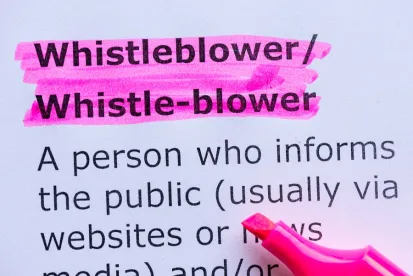On September 14, 2018, the SEC awarded more than $1.5 million to a whistleblower, an amount that was “severely reduced” due to the whistleblower’s delay in reporting and culpability in the violation. Although the order is sparse, it sends two important messages to whistleblowers: 1) report promptly; and 2) expect a significant reduction in award percentage if you are culpable in the violation.
SEC Whistleblowers Should Report Promptly
The September 14 Order underscores the importance of prompt reporting and how a delay will reduce award percentage:
Although Claimant provided important information in relation to the overall success of the enforcement action as well as ongoing assistance, Claimant unreasonably delayed in reporting the information to the Commission and was culpable. With respect to our finding that the Claimant unreasonably delayed, we have considered the following: Claimant waited for more than a year after learning of the facts underlying the violation before Claimant reported to the Commission; Claimant reported to us only after learning of the ongoing Commission investigation; during the period of Claimant’s delay, investors were being harmed; as a result of the delay, [and] the monetary sanctions upon which Claimant’s award is based increased.
Whistleblowers should report promptly not only because a delay in reporting will reduce award percentage, but more importantly, a delay in reporting could disqualify a whistleblower form receiving any award. To be eligible for an award, a whistleblower must provide the SEC with “original information”—i.e., information not already known to the SEC. If a whistleblower discloses to the SEC information about a violation of federal securities law that was previously disclosed by another whistleblower in a TCR submission, the second whistleblower to come forward will likely not receive any award.
Culpable Whistleblowers Will Rarely Receive More than the Minimum Award Percentage
When the SEC proposed rules implementing the reward provisions of the Dodd-Frank Act, some commenters urged the SEC to adopt a per seexclusion for whistleblowers that engage in culpable conduct. In the release adopting the final rules, the SEC rejected that proposal, but adopted a rule requires assessment of culpability as a negative factor that can reduce an award. In particular, under Rule 21F-6(b), the SEC may take into account:
(i) The whistleblower’s role in the securities violations;
(ii) The whistleblower’s education, training, experience, and position of responsibility at the time the violations occurred;
(iii) Whether the whistleblower acted with scienter, both generally and in relation to others who participated in the violations;
(iv) Whether the whistleblower financially benefitted from the violations;
(v) Whether the whistleblower is a recidivist;
(vi) The egregiousness of the underlying fraud committed by the whistleblower; and
(vii) Whether the whistleblower knowingly interfered with the Commission’s investigation of the violations or related enforcement actions.
17 C.F.R. § 240.21F–6(b)(1).
According to the September 14 Order, the award was severely reduced because the “Claimant—while being fully aware of the wrongdoing—nonetheless received a significant and direct financial benefit.” The order then warns culpable whistleblowers that they should expect a significant reduction in award percentage: “Whistleblowers with similar conduct should expect to receive a severely reduced award—indeed, even one as low as the minimum statutory threshold—in future cases.”
This announcement signals a slight change in policy, but as former SEC Enforcement Director Andrew Ceresney noted in a 2016 speech to whistleblower lawyers, there are benefits for culpable whistleblowers to come forward beyond potentially recovering a SEC whistleblower award:
[C]ulpable insiders with first-hand knowledge of misconduct can provide valuable information and assistance in identifying participants in, transactions relating to, and proceeds of, fraudulent schemes. And, while there are safeguards built into the program to ensure that whistleblowers do not profit from their own misconduct, including where they substantially directed, planned or initiated the misconduct of an entity, or conduct for which they are criminally convicted, culpable whistleblowers can still get paid for eligible information they report that falls outside of these limitations . . . There are also other potential benefits for culpable whistleblowers — in appropriate circumstances, we will take their cooperation under the whistleblower program and in our investigation into consideration in deciding what remedies, if any, are appropriate in any action we determine should be brought against the whistleblowers for their role in the scheme.
Although the SEC Whistleblower Program does not provide amnesty (assisting the SEC in an investigation does not preclude the SEC from bringing an action against the whistleblower), the SEC takes cooperation into account under its Policy Statement Concerning Cooperation by Individuals in Investigations and Related Enforcement Actions.
SEC Whistleblower Program
Under the SEC Whistleblower Program, whistleblowers may receive an award for providing the SEC with original information about violations that leads the SEC to bring a successful enforcement action that results in monetary sanctions exceeding $1 million. Whistleblowers are eligible to receive between 10% and 30% of the monetary sanctions collected. Since 2012, the SEC has issued approximately $322 million to whistleblowers. To learn more about the SEC Whistleblower Program, download the eBook SEC Whistleblower Program: Tips from SEC Whistleblower Attorneys to Maximize an SEC Whistleblower Award.




 />i
/>i

